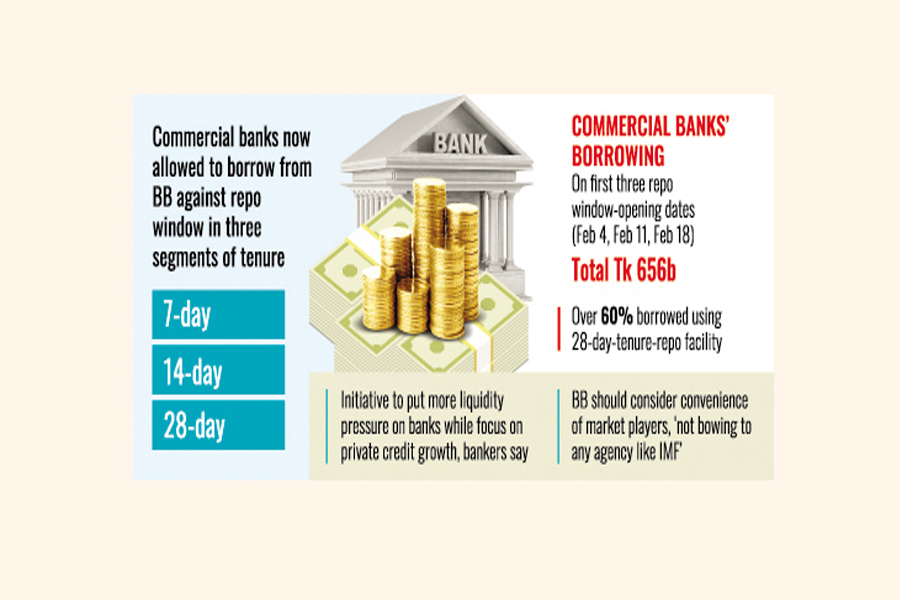Move to help banks fairly manage funds, bankers balk
Repo facility awaits regulatory axe again
BB phasing out 28-day liquidity window against repo

Published :
Updated :

Existing repo facilities are being squeezed further as the central bank is bent on phasing out its 28-day-tenure liquidity window in a move to make banks manage funds more efficiently.
Updating the bankers about such facility-curtailing move, the monetary policy unit of Bangladesh Bank sits for a meeting with the treasury officials of the commercial banks today (Monday) at the BB headquarters, officials said.
But bankers balk at the latest regulatory move on the monetary front, in a string of policy measures of recent times meant for streamlining the unkempt banking system left by the past regime.
They say such initiative will put more liquidity pressure on the commercial banks at a time when the banks are intensifying their focus on private-sector-credit growth because of the gradual fall in yields of government securities.
According to officials concerned, the move is deemed not only to force commercial lenders to seriously focus on efficient fund management but also help in making transactions on the call-money market vibrant.
To meet an IMF condition binding its $4.70-billion lending package for stabilising the country's macroeconomic situation, the Bangladesh Bank (BB) has cut down the daily liquidity support against the repo facility to twice a week (Monday and Wednesday) since last July. Later, it was reduced to once a week with effect since November last.
Following such clenched-fisted regulatory dole, the commercial banks are now allowed to borrow funds from the central bank against repo window in three segments of 7-day, 14-day and 28-day tenures.
Seeking anonymity, a central banker says they will discuss the discarding of the 28-day liquidity window with the bankers in Monday's meeting.
"After the discussion," says the BB official, "the central bank will decide from when it will implement the decision--from March or April."
The central banker says the commercial banks are observed largely using the long-term repo instrument and investing in short-term government securities to gain handsome returns.
As the yields in all segments of treasury bills and bonds plummet continuously, the BB official says, it is a right time to implement the decision.
"I think banks might face some stress temporarily, but it will be a good move for them in the long run to manage their stock of credits more efficiently."
According to the BB data, the commercial banks all together borrowed a total of Tk 656 billion in the first three repo window-opening dates (February 4, February 11 and February 18) of this month and more than 60 per cent of the funds were borrowed using the 28-day-tenure-repo facility.
But bankers think different on this policy shift. It would create more burdens on banks through disrupting their fund-settlement commitments in the current context of liquidity tightness on the money market, they say.
Preferring not to be quoted by name, the treasury head of a private commercial bank talked this issue. He said the central bank should make decision considering convenience of the market players, not bowing to any agency like the IMF.
He suggests the repo-operational process ought to be effective as the central bank automatically deducts borrowed repo credits in the morning on the maturity date from the banks' CRR account but the banks get repo funds again in the evening.
"So, the banks would face fund settlement-related problems further in the coming days with the phasing out of the instrument. The repo-driven fund injection and deduction on maturity should go simultaneously," the treasury official says.
According to the treasury head of another bank, lenders normally take money from the BB under the repo facility at a policy rate (now 10 per cent) and use the funds in high-yielding government securities or other sectors.
"By doing so, banks get a handsome spread. Now, the yields in government securities are not lucrative at all," he told the FE.
The experienced banker says the banks normally keep more funds in CRR accounts than the requirements so that the regulator can deduct borrowed repo funds on maturity.
"Despite keeping additional funds in the accounts, the banks are not getting any cost," he adds.
jubairfe1980@gmail.com


 For all latest news, follow The Financial Express Google News channel.
For all latest news, follow The Financial Express Google News channel.